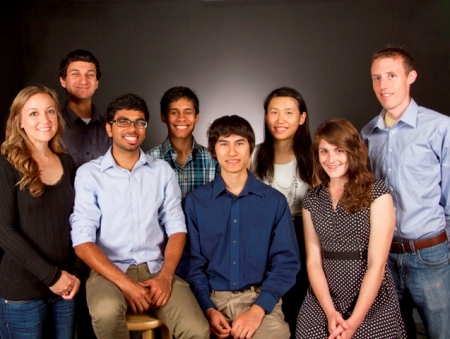Nov 27 2012
Arizona State University’s team made a strong showing this fall in one of the most prominent international student engineering and science competitions.
 The student team that represented ASU in the 2012 International Genetically Engineered Machines (iGEM) competition included (front row, from left) Amanda Ispas, Abhinav Markus, Ryan Muller, and Madeline Sands, and (back row, from left) Hyder Hussain, Nisarg Patel, Ellen Qin and Ethan Ward. (Photo by: Jessica Slater/ASU)
The student team that represented ASU in the 2012 International Genetically Engineered Machines (iGEM) competition included (front row, from left) Amanda Ispas, Abhinav Markus, Ryan Muller, and Madeline Sands, and (back row, from left) Hyder Hussain, Nisarg Patel, Ellen Qin and Ethan Ward. (Photo by: Jessica Slater/ASU)
It was one 64 teams from throughout the United States, Latin America, Europe and Asia that earned a spot in the 2012 International Genetically Engineered Machines (iGEM) World Jamboree at the Massachusetts Institute of Technology.
The competition tests students’ skills in synthetic biology, challenging them to design and build simple biological systems.
The ASU undergraduate students developed a portable, low-cost biosensor system to detect pathogens in water supplies. Pathogens are organisms that can cause serious diseases. The group’s biosensor is designed to detect pathogens that cause diarrhea, which is among the leading causes of death among children under age five.
From among 24 teams that competed in October at the iGEM Americas West Regional Jamboree at Stanford University, the ASU squad was one of eight selected to move on to the world championship event in November at MIT.
At the regional event, the team won a gold medal and the Best Human Practices Advance award, given to the team judged to be working rigorously to find new ways to help people address the impacts of ongoing advances in biotechnology.
At MIT, the team was among leading contenders for the iGEM international Best Human Practices Advance award.
“It was amazing how far we got in the competition, considering this was only the second year ASU has had an iGEM team,” says team member Abhinav Markus, a biomedical engineering major.
Along with Markus, the ASU team included: biomedical engineering majors Hyder Hussain, Ethan Ward and Amanda Ispas; anthropology major Maddie Sands; bioscience and biotechnology major Nisarg Patel; biochemistry major Rohit Rajan; and chemistry and biochemistry majors Ryan Muller and Ellen Qin.
The team was guided by advisors from the faculty of the School of Biological and Health Systems Engineering – Karmella Haynes, Vincent Pizziconi, and Xiao Wang – along with engineering graduate research assistant Rene Davis and James Alling, a bioengineering doctoral student also studying in ASU’s Sandra Day O’Connor College of Law.
As students prepared for the fall’s iGEM events, they also were mentored by a former iGEM competitor Kylie Standage-Beier, a biology student in ASU’s School of Life Sciences.
Students Markus, Hussein, Muller, Patel and Sands plan to complete development of the team’s biosensors and hope to see them used in a pilot project next year in Guatemala through community health efforts led by Jonathan Maupin, an assistant professor of medical anthropology and global health in ASU’s School of Human Evolution and Social Change.
Several members of this year’s team also will soon begin organizing an ASU 2013 iGEM team. Hoping to draw more students into the endeavor, they want to obtain designated lab space on campus for iGEM research and make iGEM projects at ASU part of the Research Experience for Undergraduates program supported by the National Science Foundation.
“Synthetic biology is a new and important field,” says team member Ispas, “and we want ASU to be a great contributor.”
The ASU iGEM team’s sponsors include: the School of Life Sciences; Barrett, The Honors College; Ira A. Fulton Schools of Engineering, including the School of Biological Health Systems and Engineering; the College of Liberal Arts and Sciences; the School of Politics and Global Studies; and the Department of Chemistry and Biochemistry.